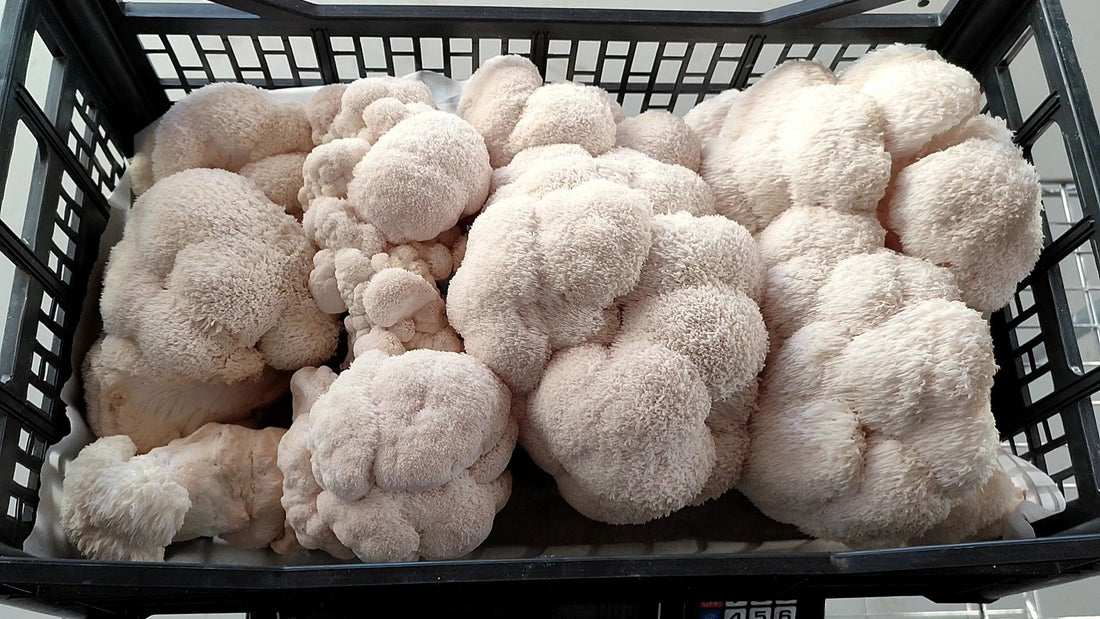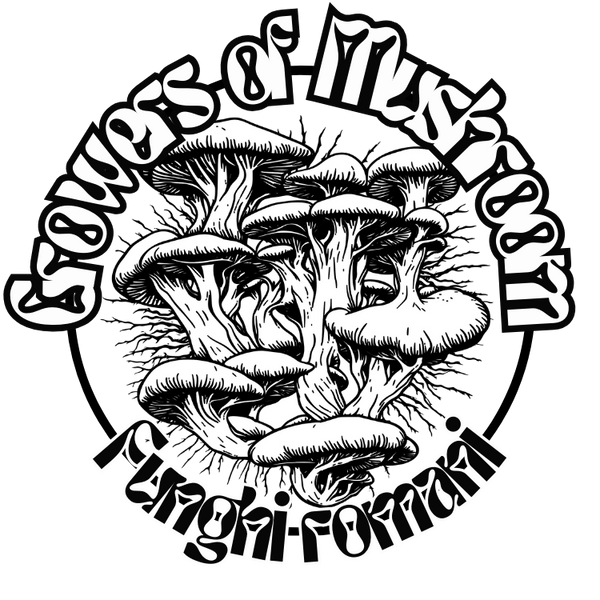
Lion's Mane: What Science Really Says — and Why We Still Love It
Here at Growers of Mushroom , we are passionate about all things mushroom — especially when it comes to one of our favorite mushrooms: the Lion's Mane ( Hericium erinaceus ).
You've probably already seen the headlines:
“Lion's Mane: Improves Memory!”
“Lion’s Mane regenerates the nerves!”
“ Hericium erinaceus a cure for anxiety!”
But what does science really say?
And what is just over-the-top marketing?
Here at Growers of Mushroom , we believe that being transparent , honest , and science -based is the best way to build trust with our community.
So, let's take a look at what the scientific literature actually says — and why Lion's Mane is still one of our favorite mushrooms!
What is Lion's Mane?
Lion's Mane is an extraordinary white mushroom, with long spines that resemble stalactites or a lion's mane, traditionally used in Chinese and Japanese herbal medicine.
In recent years, modern research has discovered its unique ability to produce natural compounds called hericenones and erinacins. These compounds can stimulate a vital protein in our body called nerve growth factor (NGF) .
NGF is essential for brain health, memory, and even mood — making this mushroom one of the most exciting natural (re)discoveries of recent decades.

What Does Science Say?
In Vitro Studies
In laboratory experiments (test tubes and cultured cells):
- Lion's Mane extracts have been shown to stimulate the production of Nerve Growth Factor (NGF) , as seen, a molecule essential for the growth, maintenance and survival of brain cells (Mori et al., 2008).
-
Other studies have shown antioxidant and anti-inflammatory effects at the cellular level.
Lab studies are helping scientists understand how Lion’s Mane might work — but actual effects in humans have yet to be clinically confirmed.
Animal Studies
In animal models, Lion's Mane has shown very interesting effects:
- In memory-impaired mice, Lion's Mane supplementation improved learning and memory performance (Mori et al., 2011).
- In rat models, Lion's Mane appears to promote the regeneration of nerves damaged following injury (Wong et al., 2011).
These findings suggest that Lion's Mane may help protect nervous system health, but animal findings don't always translate directly to humans.
Studies on Human Beings
Early clinical research suggests that Lion's Mane may support memory, mood, and sleep quality.
- Memory and Cognitive Function:
A small study in Japan (Mori et al., 2009) tested 30 older adults with Mild Cognitive Impairment . Those who took Lion's Mane powder daily for 16 weeks showed better cognitive scores than the placebo group. However, the improvements faded after they stopped taking the supplement, suggesting that continued use may be necessary. - Mood and Sleep:
Another study (Vigna et al., 2019) found that overweight, stressed adults who took Lion's Mane for 8 weeks reported improved sleep quality and reduced feelings of anxiety compared to those who took a placebo. - Cognitive Function in Healthy Adults:
Preliminary research observed improvements in cognitive functions after 12 weeks of Lion's Mane intake (Saitsu et al., 2019).
🔎 Important:
These human studies are small , short-term , and involve subjective outcomes (such as questionnaires).
They are promising, but need confirmation in larger, long-term clinical studies .
So…Is Lion's Mane a miracle cure?
Not yet.
Lion's Mane is not a drug that can replace medical treatments for serious conditions such as Alzheimer's disease or depression.
But —
✅ It is a powerful natural ally for anyone who wants to nourish their brain, support mental clarity, and take proactive steps towards long-term wellness.
✅ It's safe, natural and backed by centuries of traditional use — now confirmed by modern science step by step
✅ It is a functional food with excellent nutritional properties and rich in Beta Glucans and, most importantly... absolutely delicious to eat!

To conclude...
...you just have to try it! Grow it at home with extreme simplicity thanks to our growing kits and obtain large harvests in less than 2 weeks!
Otherwise, stop by the company to collect your box of freshly picked Lion's Mane !
Sources
- Mori et al., 2008 — Nerve growth factor-inducing activity of Hericium erinaceus in 1321N1 human astrocytoma cells
- Mori et al., 2009 — Improving effects of the Yamabushitake mushroom (Hericium erinaceus) on mild cognitive impairment: a double-blind placebo-controlled clinical trial
- Mori et al., 2011 — Effects of Hericium erinaceus on amyloid β(25-35) peptide-induced learning and memory deficits in mice
- Saitsu et al., 2019 — Improvement of cognitive functions by oral intake of Hericium erinaceus
- Vigna et al., 2019 — Hericium erinaceus Improves Mood and Sleep Disorders in Patients Affected by Overweight or Obesity: Could Circulating Pro-BDNF and BDNF Be Potential Biomarkers?
- Wong et al., 2011 — Peripheral Nerve Regeneration Following Crush Injury to Rat Peroneal Nerve by Aqueous Extract of Medicinal Mushroom Hericium erinaceus (Bull.: Fr) Pers. (Aphyllophoromycetideae)



